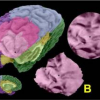Free Online Productivity Tools
i2Speak
i2Symbol
i2OCR
iTex2Img
iWeb2Print
iWeb2Shot
i2Type
iPdf2Split
iPdf2Merge
i2Bopomofo
i2Arabic
i2Style
i2Image
i2PDF
iLatex2Rtf
Sci2ools
ISBI
2004
IEEE
2004
IEEE
Cortical Surface Flattening Using Least Square Conformal Mapping with Minimal Metric Distortion
Although flattening a cortical surface necessarily introduces metric distortion due to the non-constant Gaussian curvature of the surface, the Riemann Mapping Theorem states that continuously differentiable surfaces can be mapped without angular distortion. We apply the so-called least-square conformal mapping approach to flatten a patch of the cortical surface onto planar regions and to produce spherical conformal maps of the entire cortex while minimizing metric distortion within the class of conformal maps. Our method, which preserves angular information and controls metric distortion, only involves the solution of a linear system and a nonlinear minimization problem with three parameters and is a very fast approach.
Angular Distortion | Controls Metric Distortion | ISBI 2004 | Least-square Conformal Mapping | Medical Imaging |
| Added | 20 Nov 2009 |
| Updated | 20 Nov 2009 |
| Type | Conference |
| Year | 2004 |
| Where | ISBI |
| Authors | Lili Ju, Josh Stern, Kelly Rehm, Kirt Schaper, David A. Rottenberg, Monica K. Hurdal |
Comments (0)

